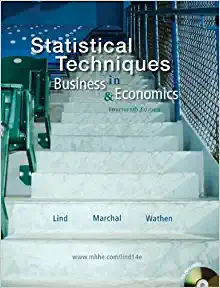Question
5. The following log- linear demand curve for a price- setting firm is estimated using the ordinary least- squares method: Q= aP b M c
5. The following log- linear demand curve for a price- setting firm is estimated using the ordinary least- squares method:
Q= aPbMcPdR
DEPENDENT VARIABLE: LNQ | R-SQUARE | F-RATIO | P-VALUE ON F | |
OBSERVATIONS: 25 | 0.8587 | 89.165 | 0.0001 | |
VARIABLE | PARAMETER ESTIMATE | STANDARD ERROR | T-RATIO | P-VALUE |
INTERCEPT | 6.77 | 4.01 | 1.69 | 0.0984 |
P | -1.68 | 0.70 | -2.40 | 0.0207 |
M | -0.82 | 0.22 | -3.73 | 0.0005 |
PR | 1.35 | 0.75 | 1.80 | 0.0787 |
a. The estimated demand equation can be expressed in natural logarithms as:
lnQ =
b. Does the parameter estimated for b have the expected sign? Explain
c. Given these parameter estimates, is the good a normal or an inferior good? Explain Is good R a substitute or a complement? Explain.
d. Which of the parameter estimates are statistically significant at the 5 percent level of significance?
e. Find the following estimated elasticities:
a. The price of elasticity of demand ().
b. The cross- price elasticity of demand (XR)
c. The income elasticity of demand (M)
f. A 10 percent decrease in household income, holding all other things constant, will cause quantity demanded to _____________ (increase, decrease) by ___________ percent.
g. All else constant, a 10 percent increase in price causes quantity demanded to _______________ (increase, decrease) by __________ percent.
h. A 5 percent (5%) decrease in the price of R, holding all other variables constant, causes quantity demanded to ______________ (increase, decrease) by ___________ percent.
Step by Step Solution
There are 3 Steps involved in it
Step: 1

Get Instant Access to Expert-Tailored Solutions
See step-by-step solutions with expert insights and AI powered tools for academic success
Step: 2

Step: 3

Ace Your Homework with AI
Get the answers you need in no time with our AI-driven, step-by-step assistance
Get Started


